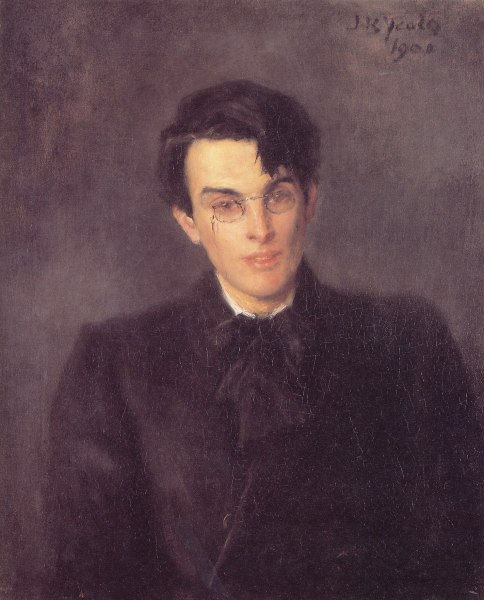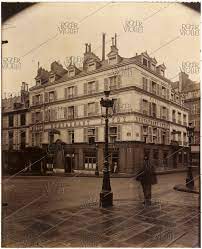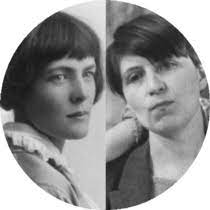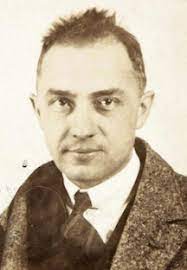New York City, February, 1922
John Quinn, 51, has received a cable from James Joyce, just turned 40, in Paris:
Ulysses published. Thanks.
Bit of an understatement.

James Joyce, Ezra Pound, Ford Madox Ford, and John Quinn in Paris
Quinn has been supporting Joyce financially, legally, and sometimes emotionally, while he was writing the novel. He’d even gone to court for the right of The Little Review to publish ‘obscene’ chapters. Quinn didn’t win that legal battle, but felt that getting the publishers off with a $100 fine was itself a victory.
He cables back right away,
Congratulations publication Ulysses. Best wishes. Write soon.
Then he starts composing an angry letter to the woman who had taken the risk to publish Ulysses, American ex-patriate Sylvia Beach, 35, owner of the Left Bank bookstore, Shakespeare & Co. He is a bit annoyed that she has written to him about Joyce:
If Joyce wants to write to me at any time it is open to him to do so and not through you.

Sylvia Beach and James Joyce in her bookshop, Shakespeare & Co.
But what has made him even angrier is that in her most recent letter she has asked whether Ulysses’ US copyright is covered by the publication of the chapters in The Little Review.
Quinn reminds her that he has already told Joyce, often, that it is. However, her advertisement for the novel in the magazine might set off the censors again! Now the customs authorities will be watching all the post from Paris to New York.
Quinn paid for his own 14 copies in advance, telling Beach,
They will become my property and then I must be consulted as to how they are to be sent here…[Set them aside] carefully wrapped up, and held subject to my order.
He then suggests ways copies might be smuggled into the US via Canada.
Now Quinn has to focus on his problem right here in New York: John Butler Yeats, painter and father of his friend, poet William Butler Yeats, 56, whom he has been supporting for the past 14 years of his self-imposed exile in Manhattan, has died, aged 82. Quinn’s ‘assistant’ (and lover), Mrs. Jeanne Foster, 42, has been watching over JB in his lodgings on West 29th Street the past two days, and he succumb in the night.

W B Yeats by his father John Butler Yeats, 1900

John Butler Yeats’ self-portrait
Quinn and Foster have to deal with the doctor, the friends, the visitors—and what about the funeral? New York or Dublin?
***
Downtown from Quinn’s 11-room Central Park West apartment, lunch is on at The Algonquin Hotel. For the past three years, the writers and freelancers who work for nearby newspapers and magazines—Life, Vogue, the World—come by to have lunch and trade quips.
Dorothy Parker, 28, nee Rothschild, is trying to calculate if she can afford a half-order of the eggs. Her friends are carefully avoiding discussing her recent suicide attempt. The fact that she had ordered dinner to be delivered from the nearby Alps Restaurant just before she tried to slit her wrists with her husband’s dull razor, makes it more drama than tragedy.

The Algonquin Round Table by Al Hirschfeld
Parker’s main supporter, fellow free-lancer and former Vanity Fair writer, Robert Benchley, 32, is one of the few who had come to see her in the hospital. Bench had told her,
Go easy on this suicide stuff. First thing you know, you’ll ruin your health.

Dorothy Parker and Robert Benchley
***
Farther down in midtown, in Scribner’s offices on Fifth Avenue, editor Maxwell Perkins, 37, is planning to have a discussion with his current star author, F. Scott Fitzgerald, 25.
Fitzgerald’s second novel, The Beautiful and Damned, is about to come out. Perkins feels it is a good follow up to his first, The Far Side of Paradise. Now the editor thinks Fitzgerald could take a different turn, and, discussing the advertising for Damned, Perkins tells him,
We ought to…get away altogether from the flapper idea.

F. Scott Fitzgerald

Maxwell Perkins
***
Farther down Manhattan, at JB Yeats’ rooms in Chelsea, Quinn and Foster are beginning to sort through the late painter’s belongings, waiting for instructions as to whether JB should be sent to Ireland or laid to rest here in his adopted home, New York.
Quinn is composing a telegram to the Yeats sisters in Dublin:
Regret your father passed away this morning 7 o’clock…The end came in sleep without pain or struggle. After conference please cable desires about burial…Everything was done for his comfort and peace of mind and he had best possible medical attention.
Next, he sends the details to the painter’s son, Willie, currently in Oxford, adding,
He fought bravely for life but it was almost hopeless since Wednesday. His mind was unclouded and his spirits buoyant until the end.

Jeanne Foster by John Butler Yeats

John Quinn
Dublin, February, 1922
In Dundrum, south Dublin, Lily, 55, and Lolly Yeats, 53, read the telegram they had been dreading from their American friend, John Quinn.

Lily and Lolly Yeats
They knew that Quinn had worried that the old man would die ‘on his watch.’ Right now, they feel nothing but gratitude for all Quinn has done for him.
Of course, they will need to check with their brother Willie in Oxford, but agree that it is best to advise Quinn to handle the funeral arrangements in New York.
London, February, 1922
Everyone has the flu.
The Times reports that 13,000 people in England and Wales have died since Christmas. They caution that one of the symptoms is a ‘tendency to “feel the heart”—ie., to palpitations,’ and that anyone suspecting they have contracted the disease should take to their beds at once. Just last month they had reported that Pope Benedict XV, 67, had died from influenza that turned into pneumonia.

Pope Benedict XV
***
T. S. Eliot, 33, is trying to get his new long poem published. As soon as he returned home last month, reinvigorated by a three-month leave spent in Switzerland, he had been laid low with the influenza for a good ten days. At least that meant time away from his dreaded office at Lloyds Bank so he could work on finishing off The Waste Land.
Eliot has been corresponding with The Dial magazine in the States, but is leery about the deal on offer. He feels he had been burned a few years ago by a contract with Alfred Knopf that John Quinn had negotiated for him. Now he is using his friend Ezra Pound, 36, as a go between.

T. S. Eliot and Ezra Pound
***
In the southwest suburb of Richmond, Virginia Woolf, just turned 40, is devastated that she is spending the first months of this year as she had the previous summer—in bed. She confides to her diary,
I have taken it into my head that I shan’t live till 70…Suppose, I said to myself the other day[,] this pain over my heart wrung me out like a dish cloth & left me dead?
The flu had hit her just a few weeks before her 40th birthday, which made her acutely aware of the passage of time:
I feel time racing like a film at the Cinema. I try to stop it. I prod it with my pen. I try to pin it down.’
Her husband Leonard, 41, however supportive, insists on following the doctor’s instructions that she must stay in bed. But Virginia wants to be out in the cold air, walking, which means writing, because she works out her sentences in her head as she makes her way through the London streets.

Virginia and Leonard Woolf
Virginia is thinking of experimenting with a tale of a woman walking through the city while preparing for a party, the passage of the hours marked by Big Ben’s bongs.
Her sister, painter Vanessa Bell, 42, hasn’t let her children’s flu keep her from her work. She is in Paris, again, for a painting holiday. Virginia writes to her,
For Gods [sic] sake make friends with Joyce. I particularly want to know what he’s like.’
She’d read parts of Ulysses when it had been submitted to her and Leonard for publication by their Hogarth Press. She can’t imagine what kind of working class man could write like that.

Virginia Woolf and Vanessa Bell
Paris, February, 1922
Newlyweds Hadley, 30, and Ernest Hemingway, 22, are back from a Switzerland skiing trip and settling in to their new fourth floor walk-up apartment at 74 rue du Cardinal Lemoine.

Hadley and Ernest Hemingway
Ernest has taken an office on the Rue Mouffetard, a pleasant five-minute walk away. Going there on a regular schedule is the only way he is going to get any writing done.
After all, that’s why they came at the end of last year. Paris is so cheap, the exchange rate so good, and between his salary as a foreign correspondent for the Toronto Daily Star, and his wife’s family money, they can afford an apartment, a studio, and dinner at local cafes every night. Great French food is 50 US cents for a meal; the wine only 60 centimes for a whole bottle.
Ernest is eager to get started on his writing career, and is planning to make good use of the contacts he had been given last summer back in Chicago by Sherwood Anderson, 45, author of the hit novel, Winesburg, Ohio.

Sherwood and Tennessee Anderson
Anderson and his wife, Tennessee, 48, had just come back to the States from Paris and encouraged the young Hemingways to follow in their footsteps. He gave Ernest an all-important letter of introduction to fellow American writer Gertrude Stein, celebrating her 48th birthday. Ernest and Hadley are gathering the courage to visit Stein and her partner, Alice B. Toklas, 44, soon.

Alice B. Toklas and her partner Gertrude Stein with Picassos
***
Another expatriate, Kansas-born Robert McAlmon, 25, is in Paris, also with his new wealthy wife, Bryher, 27. As well as supporting himself as a writer with her inheritance, McAlmon intends to use her family money to publish other writers on the Left Bank.

Bryher and Robert McAlmon
Soon after he came to Paris two years ago, McAlmon had struck up a close friendship with an Irishman, James Joyce. McAlmon had supported his new friend while he was struggling with his big novel, both financially and practically by helping with the typing of the manuscript.
But now that publication day—and Joyce’s big birthday—is nearing, McAlmon chickens out. He takes off for the Riviera. He figures he’ll just buy Joyce a present.
***
Standing on the platform at the Gare du Lyon, Sylvia Beach is waiting for the Paris-Dijon Express, due in at 7 am.
When she’d told Joyce that her printer in Dijon guaranteed to put the parcel in the post on 1st February, Joyce was not pleased. He insisted that the package be put on the train so the conductor can hand deliver it to Sylvia personally.
As the train approaches, Beach is working out her next steps in her head. She will get a taxi to Joyce’s apartment, to give him the 40th birthday present that he wants the most, the first copy of Ulysses. There is a small party planned for tonight at one of Joyce’s favorite restaurants, Ferraris. He and his partner, Nora Barnacle, 37, and a few friends will be celebrating his accomplishment, seven years in the making, the result of his relentless vision and the support of his family, Sylvia Beach…and John Quinn.

American Sylvia and her Irishman on rue de l’Odeon

American Kathleen and her Irishman on rue de l’Odeon




































